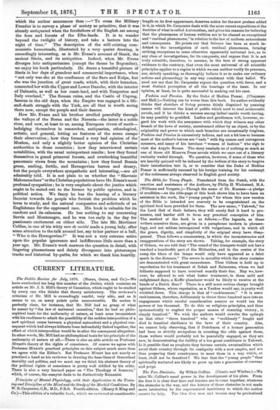The Bible for Young People. Translated from the Dutch, with
the sanction and assistance of the Authors, by Philip H. Wicksteed, M.A. (Williams and Norgate.)—Though the name of Dr. Kuenen—a pledge of erudition—on the title-page of this book shows him to have been an assistant in the work, the "young people" for whom this new version of the Bible is intended are scarcely to be congratulated on the spiritual food here provided for them. The new name, "Yahweh," for the Lord God of their fathers, they will surely find it hard to pro- nounce, and harder still to form any practical conception of him. The method of the book is as follows :—The legends, as these writers conceive them, are given in a paraphrase modern in phraseo- logy, and not seldom interspersed with vulgarisms, and in which all the grace, dignity, and simplicity of the original story have disap- peared. Then follows a commentary, in which the inconsistencies and exaggerations of the story are shown. Taking, for example, the story of Gideon, we are told that "The sound of the trumpets would not have reached a hundredth part of the Midianites, and in the centre of the camp the blaze of the lamps would only have appeared as a faint spark in the distance." The errors in morality which the story contains are demonstrated with great earnestness. Thus Gideon is held up to reprobation for his treatment of Zebah and Zalmunno, whom we had hitherto supposed to have received exactly their due. May we, how- ever, be allowed to ask what better treatment, in these mild and enlightened days, a Kaffir plunderer would be likely to receive at the hands of a Dutch Boer? There is a still more serious charge brought against Gideon, whose reputation, as a Yankee would say, is pretty well whittled down. This charge is that of "recklessness." "It is mere recklessness, therefore, deliberately to throw three hundred men into an engagement which careful consideration assures us would tax the powers of ten thousand. To do this on religious principles, and thus systematically to neglect the proper means of ensuring victory, is simply fanatical." We wish the authors would rewrite the epitaph on that other "three hundred" who so " recklessly " fought and died in fanatical obedience to the laws of their country. Also, we cannot help observing, that if Dutchmen of a former generation had been so strictly scrupulous in counting the odds against them, these writers would probably not be peacefully engaged, as they are now, in demonstrating the futility of a too great confidence in Yahweh.
Is it possible that as prophets they foresee certain eventualities which await their country through its contiguity with a new empire, and are thus preparing their countrymen to meet them in a way which, at least, shall not be fanatical ? We fear that the "young people" thus spiritually nurtured are likely to grow up into a generation of cravens and prigs.






























 Previous page
Previous page